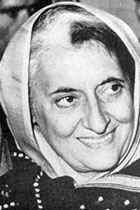Todays topic Iron Lady Of India
Indira Gandhi

Indian history has been witness to only one female Prime Minister - Indira Gandhi. She was the third Prime Minister of India and the daughter of the first - Pandit Jawarharlal Nehru. Her charm, intelligence and charisma made her a powerful statesperson, much loved and admired by her people.
A Politically Charged Childhood
Born on 19th November 1917, in Allahabad, she was greatly loved by her parents and her grandfather Motilal Nehru, who was a famous lawyer, and a public figure in his own right.
Her father had joined the freedom struggle, so little Indira, or Priyadarshani as she was lovingly called, was exposed to politics from the age of 3 or 4 years. Her house was the centre of political activity, as all the important leaders stayed there on visiting Allahabad. Mahatma Gandhi was a frequent visitor to her father's residence and she was greatly affected by his thinking. A visit to the Sabarmati Ashram left an indelible mark on her psyche and she was impressed by the simple, hard life and patriotic feelings that she witnessed there.
She passed her Metric from Pune University and was then sent on to Shantiniketan, formed by Rabindranath Tagore. Here she was made to lead a strict highly disciplined life. From here she went on to study in Switzerland and then to Oxford University in London.
Her Father's Daughter
After her return to India she married Feroze Gandhi, in March 1941 much against the wishes of the conservative Hindu community, as he was a Parsee. But Nehru was on her side. When Indira's father was in jail he used to write beautiful, long letters to her about his patriotic feelings and the current political situation. This led her to understand the intricacies of the nation, better than the most. In 1942, she joined the 'Quit India' Movement along with her husband and was arrested and jailed.
After India gained freedom, Pandit Nehru was elected Prime Minister. After his death in 1964, Lal Bahadur Shastri took over. And then in 1966, Indira Gandhi was elected leader of the Congress.
Her Tenure As Prime Minister
Indira will be remembered for her commendable efforts in the development and progress of science, space exploration, irrigation, as well as policies like the nationalisation of banks and the 20-point programme.
But on the other hand, the enormity of the problems she faced was the cause of much heartache. There were problems in Assam, Punjab as well as East Bengal. And in 1971, Pakistan attacked India and forced another smaller partition - the creation of Bangladesh.
On June 26th, 1975, Mrs. Gandhi declared an emergency, due to the turbulent political situation in the country at that time. Janta Party leaders like J.P. Narayan were arrested and jailed. But Mrs. Gandhi lost out to them in the next election in 1977 and was re-elected to power in 1980. Later, in Punjab there was a demand for a separate state of Khalistan, and the Sardarji's were up in arms. But their demands were not met and this was the cause of her ultimate assassination.
The End
On Wednesday, October 31, 1984, when Indira Gandhi was proceeding to her office, she was gunned down by her own bodyguards. This day has gone down in History as national Unity Day, as a tribute to the memory of a Great lady, leader and statesperson.
Spider-Man is the quintessential Marvel character. Although a super hero, he is spared none
of the slings and arrows of ordinary life; he experiences d ifficulties with friends, family,
ifficulties with friends, family,
sweethearts and employers. His powers enable him to do good, but not to improve his own lot in life, and it is his simple humanity, rather than his exotic talent, that has won him millions of enthusiastic fans. He is one super-hero who has not lost the common touch, and in fact he is frequently described as "your friendly neighborhood Spider-Man."
In his 1962 debut, Spider-Man took to fighting crime for a reason commonplace in comc books: he was motivated by the murder of a father figure, his Uncle Ben. Yet Spidey's driving force is guilt, not revenge; he must live forever with the knowledge that he could have prevented the killing if he  had not been so self absorbed. Perhaps he suffers from a classic Oedipus complex; in any case he is certainly neurotic, forever agonizing over the choices that confront him when he attempts to do the right thing. Despite his best efforts, he is viewed with a touch of suspicion by those in authority, and is sometimes considered little more than a criminal himself.
had not been so self absorbed. Perhaps he suffers from a classic Oedipus complex; in any case he is certainly neurotic, forever agonizing over the choices that confront him when he attempts to do the right thing. Despite his best efforts, he is viewed with a touch of suspicion by those in authority, and is sometimes considered little more than a criminal himself.
Although nobody seems to understand him, Spider-Man has the spirit to be a joker as well as a tragic figure. He is quick with a quip, appreciates the irony of his endless predicaments, and relishes the chance to play tricks on people who never suspect that he and Peter Parker are one and the same. As originally depicted by writer Stan Lee and artist Steve Ditko, Peter Parker was just a bit of a wimp . Bright, imaginative, but nonetheless an alienated adolescent, he might well have been a typical comic book reader. Although he has matured and gained in confidence over the years. Spidey is still all to human. He misses appointments, catches the flu when he needs to fight, forgets to put film in his camera and has trouble paying the rent. In short Spider-Man remains Everyman, "the super hero who could be you."
As originally depicted by writer Stan Lee and artist Steve Ditko, Peter Parker was just a bit of a wimp . Bright, imaginative, but nonetheless an alienated adolescent, he might well have been a typical comic book reader. Although he has matured and gained in confidence over the years. Spidey is still all to human. He misses appointments, catches the flu when he needs to fight, forgets to put film in his camera and has trouble paying the rent. In short Spider-Man remains Everyman, "the super hero who could be you."



Comments